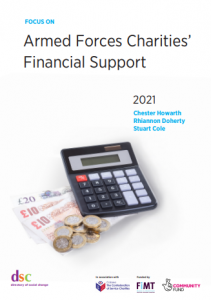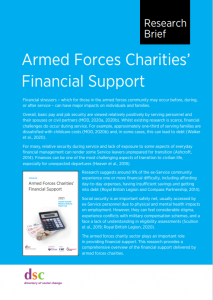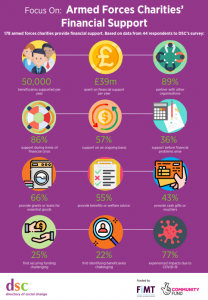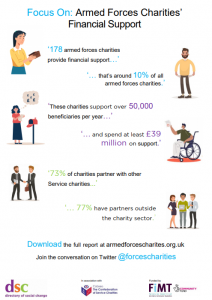Research, Armed Forces charities research
Focus On: Armed Forces Charities' Financial Support
In this report, DSC explores armed forces charities' financial support.
What is the purpose of the report?
Financial stressors can have major impacts on individuals and families and, for those in the armed forces community, may occur before, during or after service. Moreover, maintaining financial health can require aspects of financial planning unique to being in the armed forces community.
To better understand the role of armed forces charities in providing financial support, for the first time, this report provides a comprehensive overview of this part of the sector.
What does it cover?
As part of the Focus On series, this report provides more specific analysis of the work of armed forces charities across the UK – in this case, armed forces charities which provide financial support. By financial support, we mean any activities which help beneficiaries to meet an immediate financial need, relieve financial hardship or meet long-term financial goals.
The report provides the reader with:
- An exploration of the types of financial support
- Insights into the characteristics of the beneficiary population
- An examination of charities’ expenditure on financial support
- Collaboration, impact measurement and practical challenges
In addition, the report includes several case studies to demonstrate the work undertaken in providing financial support.
Who is it for?
This is a unique resource for charities, practitioners, government, policymakers and researchers to understand what armed forces charities deliver in terms of their financial support.
What did we find?
Some of the key findings in the report include:
- 178 armed forces charities provide financial support, only around 9.9% of the armed forces charity sector.
- Survey respondents supported approximately 50,000 beneficiaries and spent approximately £39 million on financial support in the year to July/August 2020.
- Armed forces charities provide at least eight distinct types of financial support.
- Support is most commonly provided during times of crisis, such as dealing with debt, homelessness or bereavement – but over half of the respondents provide financial support more generally, on an ongoing basis.
- Providing financial support is a collaborative effort, within and beyond the charity sector, with almost nine-tenths of the survey respondents reporting a collaboration.
- Funding is a key challenge in providing financial support.
- The impacts of Covid-19 are widespread and overlapping.
What did people say?
Ray Lock CBE, Chief Executive of Forces in Mind Trust: ‘Financial advice and support are two of the most frequent reasons members of the Armed Forces community have for reaching out to charities. This report reflects the breadth of such charities and the extent to which they collaborate. Understanding the environment in which charities operate is key to making the case for funding, and for ensuring that support reaches beneficiaries in the most effective and efficient manner.’
Lieutenant General Sir Andrew Richard Gregory KBE CB DL, Chief Executive of SSAFA, the Armed Forces charity (from the Foreword): ‘Providing financial support is regularly the foundation on which veterans and their families can be helped to regain their independence and dignity. … I commend another excellent and relevant report by DSC; it shines a spotlight on a strategically important subject.’



